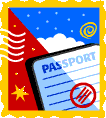|
|
 |
|
|
|
...where, when, why, and how...
|
|
|
|

|

|
TRAVEL DOCUMENTS: PASSPORT & VISA
|
|

PASSPORT DOCUMENT.
The first and most important item necessary for your foreign trip / travel abroad is your PASSPORT.
The Passport, which is issued to citizens of each respective countries for travel purposes, is an official document identifying
your nationality, and is necessary for travel between countries or crossing national borders.
For American travelers, PLEASE
BE INFORMED that beginning this coming January 8, 2007, all travels to and from the United States,
Mexico and Canada
will now be required to present a valid Passport. You'll need to present proper documentation providing proof of citizenship
and identity when you check in for international flights as well. Your travel documents and identification may be checked
randomly on multiple occasions, so it is highly recommended that you keep your valid travel documents with you AT
ALL TIMES throughout your travels. If your documentation is either inadequate or insufficient, you may
NOT be allowed to board the aircraft for your flight, and may warrant undue delays and inconveniences on your part.
It is the travelers responsibility to
know what the required documentations are for international travel. For the most current list of accepted documents for
U.S. citizen proof of citizenship and
identity, please visit the U.S. National Passport Information Center website at www.travel.state.gov or visit the U.S. Customs and Border Protection (USCBP) website at www.cbp.gov for documentation requirements and other relevant information.
If you're a citizen of another country and
you intend to travel / visit the United States, it is recommended
that you contact the nearest United States Embassy or Consulate in your country for the most current /latest updated travel documentary requirements.
VISA
After deciding which country you want to visit, the next thing you need to know is whether the particular
destination country of your choice will require certain types of Visas, usually depending on the purpose of the visit.
Travel visas are nothing more than special
notations and stamps that are placed on the passport page(s) by consular officers of foreign
countries, which allow a person to enter and leave these countries. If required, you can obtain the particular visa from
the appropriate foreign consular representative before your scheduled travel abroad. Allow sufficient time for processing
the visa application, especially if applying by mail. For Americans, further information about travel visas may
be obtained at www.travel.state.gov. The site also provides information for foreigners /non-Americans wishing to visit
the United States. To check whether you will need a Visitor's /Tourist
Visa to the country you're going, click HERE...
|
|
INTERNATIONAL TRANSPORTS : AIRLINES & CRUISESHIPS
|
|
|
|
PHILIPPINE EMBASSIES & CONSULATES
|
.
|
|
DEPARTMENT OF FOREIGN AFFAIRS (DFA)
Department of Foreign Affairs (DFA)
Roxas Boulevard, Pasay City
Metro-Manila
Consulates and/or
Consular Offices
These are government offices that help or provide
assistances to travelers while in foreign countries. In the event of an emergency, travelers should be
directed to their respective local consulate/consular office in that country. The consulate will be able to help travelers
get in touch with other family members should the need arise. Local hotels, as well as local tourist information offices, should
be able to direct you to the pertinent Consulate.
Visitors to the Philippines will easily
and almost always find the Consulate representing their respective countries.
|


|
|
INTERNATIONAL TIME-KEEPING
|
|
|
Philippine Standard Time is + 8 hours ahead of Greenwich
Meridian Time (GMT) /or Universal Time (UT).
(It is therefore already 8:00 in the morning in Manila, while it is
still 12:00 (am) midnight in London)
|

|
|
 |
|
|
|
Copyright 2006 © All Rights Reserved
|
|
|
 |

